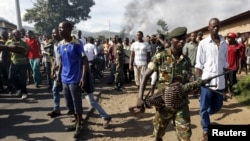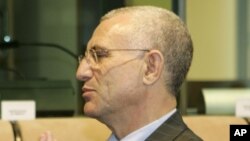U.N. Secretary-General Ban Ki-moon is sending a special envoy to Burundi, where the president's decision to run for a third term has sparked three days of sometimes violent street protests.
Ban's office said Tuesday that his special envoy for the Great Lakes Region, Said Djinnit, will hold consultations with President Pierre Nkurunziza, government officials, and political party leaders. The U.N. chief called on security services to exercise restraint, and for all parties to reject violence and avoid inflammatory speech.
At least five people have died this week in clashes between police and protesters in the capital, Bujumbura. Hundreds marched in Bujumbura Tuesday, but were blocked by police from reaching the city center.
The United Nations refugee agency says more than 5,000 Burundian civilians have crossed into Rwanda since the weekend. It says most are women and children, who say they experienced intimidation and threats of violence related to the upcoming presidential election.
The protests began Sunday, a day after the ruling CNDD-FDD party nominated Nkurunziza to run for a third term. Critics of the president say a third term would violate the constitution.
Former president Sylvester Ntibantunganya said in an interview with NTV-Uganda that he believes the current president should respect the constitution and not run for a third term.
Nkurunziza's eligibility comes down to the wording of a peace agreement and the constitution.
Burundi's existing political structures were founded on the 2000 Arusha agreement, which brought to an end the civil war between Hutu and Tutsi factions that killed up to 300,000 people. That agreement says the president can serve no more than two terms in office.
But the 2005 constitution states the president must be elected through “universal direct suffrage,” interpreted to mean a popular vote. Nkurunziza was elected by parliament to his first term, so his supporters argue he is eligible to run again.
President Nkurunziza has faced revolt from within his own party over his presumed candidacy. Seventy-nine members of the ruling party wrote the president last month asking him not to seek office.
His government has been under fire from rights groups and the international community for excluding the opposition and silencing voices of dissent.
Rights groups have accused the ruling party of arming its youth wing, known as the Imbonerakure, and using them to attack opponents in the past. Human Rights Watch last month said members of the group assisted the police and military in executing 47 people following a confrontation with an unnamed armed group in northwestern Cibitoke province.
The international community, including the United Nations, the United States and the African Union have urged Burundian political actors to respect the rule of law and hold fair elections.






